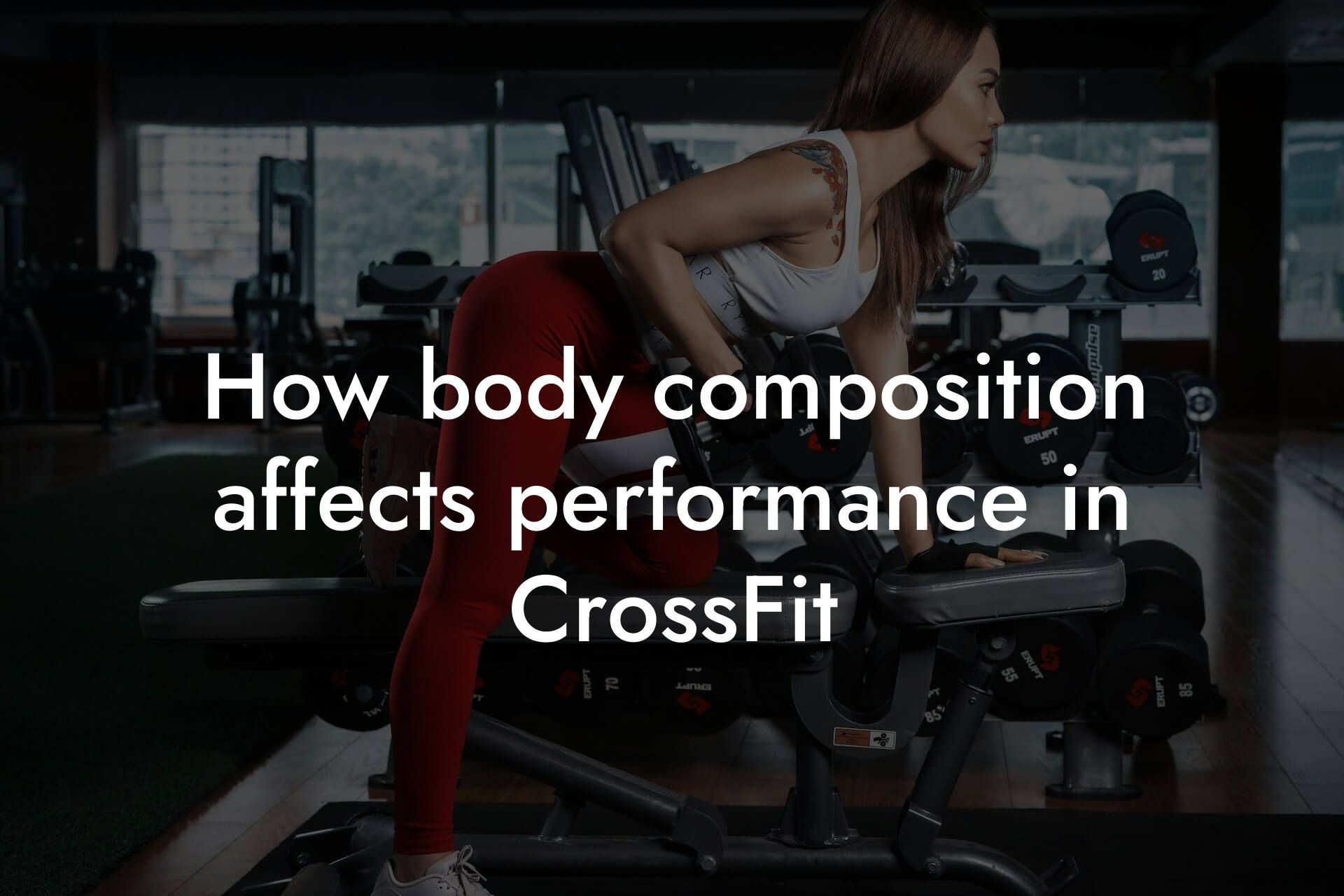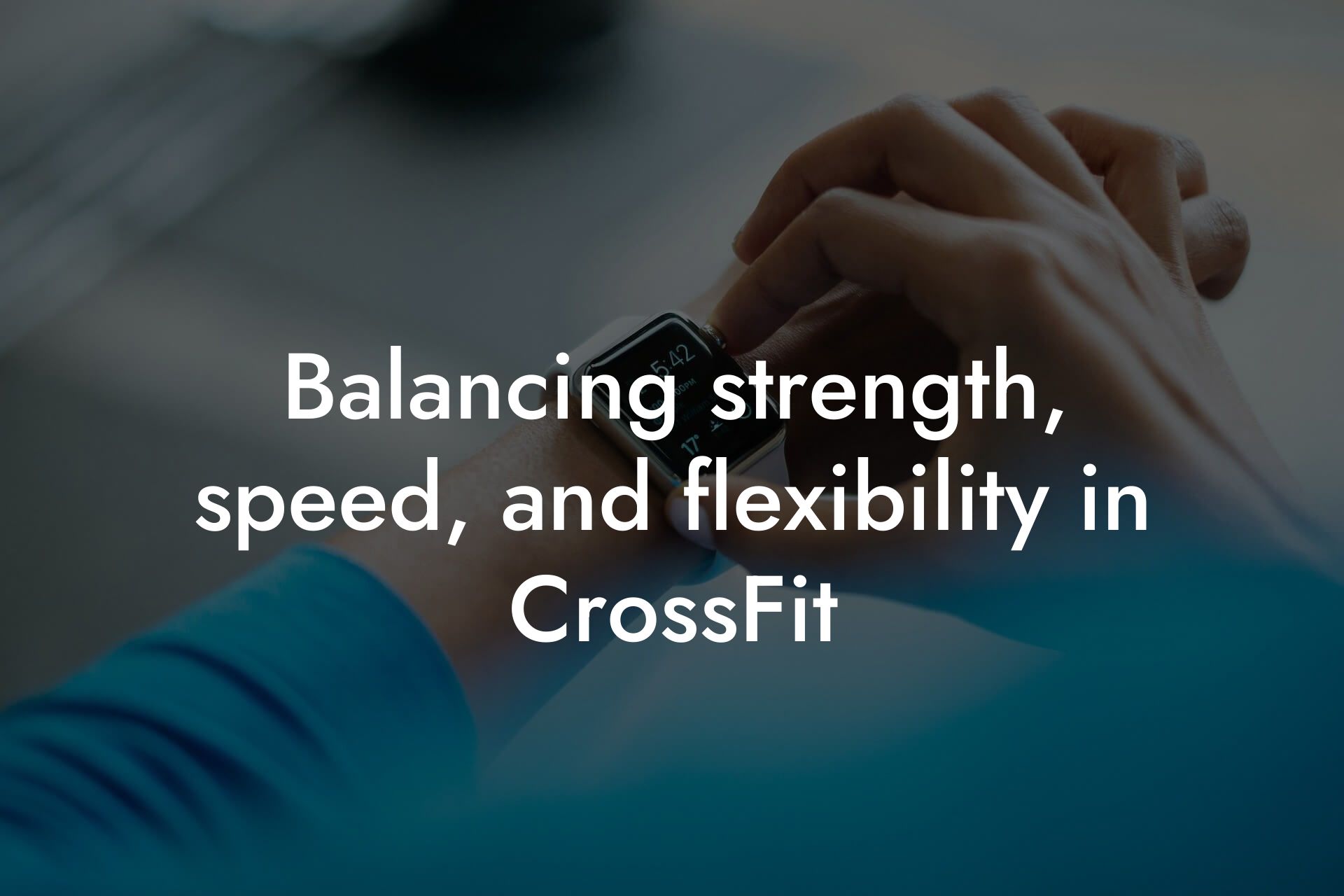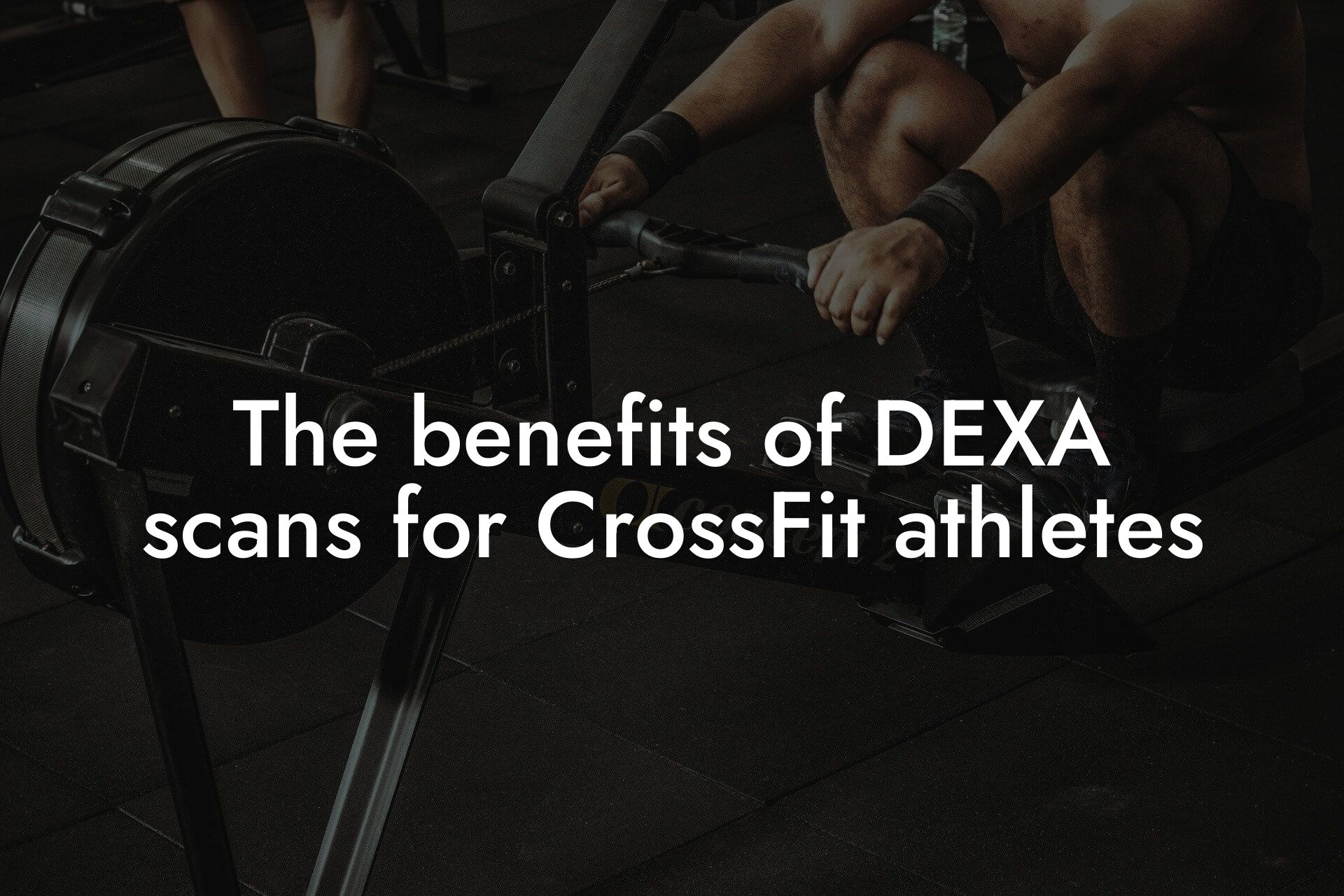As a high-earning professional, you understand the importance of maintaining a healthy physique and optimal body composition to perform at your best. At Tano Performance Group, we're committed to providing you with the tools and knowledge you need to take your fitness journey to the next level. In this article, we'll dive into the essential nutrition tips for sustaining energy during CrossFit workouts, helping you power through even the most intense WODs.
Table of Contents
Understanding Your Energy Needs
Before we dive into the nutrition tips, it's crucial to understand your energy needs during CrossFit workouts. CrossFit is a high-intensity, high-volume training program that requires a significant amount of energy to perform at optimal levels. Your body relies on three primary sources of energy: carbohydrates, protein, and fat. During high-intensity exercise, your body primarily uses carbohydrates and fat as energy sources. However, protein also plays a critical role in muscle repair and recovery.
Macronutrient Breakdown
To sustain energy during CrossFit workouts, you'll want to focus on a balanced macronutrient breakdown. Aim to consume:
- 2-3 grams of carbohydrates per kilogram of body weight from sources like sweet potatoes, brown rice, and whole grain bread
- 1.6-2.2 grams of protein per kilogram of body weight from sources like lean meats, fish, eggs, and dairy
- 0.5-1 gram of healthy fats per kilogram of body weight from sources like nuts, seeds, and avocados
Pre-Workout Nutrition
What you eat before your CrossFit workout can significantly impact your performance. Aim to consume a balanced meal or snack 1-3 hours before your workout, including:
- Complex carbohydrates like oatmeal or sweet potatoes
- Lean protein like chicken or fish
- Healthy fats like nuts or seeds
Example pre-workout meal: grilled chicken breast with sweet potato and steamed vegetables.
Intra-Workout Nutrition
During long or intense CrossFit workouts, it's essential to replenish energy stores and prevent dehydration. Consider consuming:
- Electrolyte-rich drinks like coconut water or sports drinks
- Simple carbohydrates like dates, honey, or energy gels
- BCAAs (branched-chain amino acids) to reduce muscle soreness and fatigue
Post-Workout Nutrition
After your CrossFit workout, it's crucial to refuel and replenish energy stores. Aim to consume a balanced meal or snack within 30-60 minutes, including:
- Complex carbohydrates like whole grain bread or fruits
- Lean protein like whey protein or lean meats
- Healthy fats like nuts or seeds
Example post-workout meal: Greek yogurt with berries and honey, accompanied by a handful of almonds.
Hydration
Adequate hydration is critical for optimal performance during CrossFit workouts. Aim to consume:
- At least 8-10 glasses of water per day
- Electrolyte-rich drinks during and after intense workouts
Supplements
While a balanced diet should always be the primary focus, certain supplements can help support energy production and recovery during CrossFit workouts. Consider adding:
- Creatine monohydrate to increase muscle strength and endurance
- Beta-alanine to delay fatigue and improve high-intensity exercise performance
- L-carnitine to support energy production and reduce muscle soreness
Meal Frequency and Timing
To sustain energy during CrossFit workouts, it's essential to maintain a consistent meal frequency and timing. Aim to eat:
- 3-5 main meals per day, spaced 3-4 hours apart
- 2-3 snacks per day, spaced 1-2 hours apart
Example meal plan:
Frequently Asked Questions
What are the key nutrients for sustaining energy during CrossFit workouts?
When it comes to sustaining energy during CrossFit workouts, it's essential to focus on consuming the right balance of macronutrients, including carbohydrates, protein, and healthy fats. Carbohydrates provide energy for your workouts, protein helps with muscle repair and recovery, and healthy fats support hormone production and overall health. Additionally, don't forget to stay hydrated by drinking plenty of water throughout your workout.
How many calories do I need to consume before a CrossFit workout?
The number of calories you need to consume before a CrossFit workout depends on several factors, including your weight, fitness level, and the intensity and duration of your workout. As a general rule, aim to consume 150-300 calories 1-2 hours before your workout, consisting of a balanced mix of carbohydrates, protein, and healthy fats.
What are the best sources of carbohydrates for energy during CrossFit workouts?
Complex carbohydrates such as whole grains, fruits, and vegetables are excellent sources of energy for CrossFit workouts. These foods are rich in fiber, vitamins, and minerals, and provide sustained energy throughout your workout. Some examples of complex carbohydrates include brown rice, quinoa, sweet potatoes, and leafy greens.
How much protein do I need to consume after a CrossFit workout?
Consuming protein after a CrossFit workout is essential for muscle repair and recovery. Aim to consume 20-30 grams of protein within 30-60 minutes after your workout, and continue to consume protein-rich foods throughout the day. Good sources of protein include lean meats, fish, eggs, dairy, and plant-based options like beans and legumes.
What are the best sources of healthy fats for energy during CrossFit workouts?
Healthy fats such as nuts, seeds, avocados, and olive oil are excellent sources of energy for CrossFit workouts. These foods are rich in omega-3 fatty acids, which support hormone production and overall health. Additionally, healthy fats provide sustained energy and can help reduce inflammation.
How important is hydration during CrossFit workouts?
Hydration is crucial during CrossFit workouts, as it helps regulate body temperature, transport nutrients and oxygen to your muscles, and remove waste products. Aim to drink at least 8-10 glasses of water per day, and make sure to drink water before, during, and after your workout.
What are some common mistakes people make when it comes to nutrition and CrossFit workouts?
Some common mistakes people make when it comes to nutrition and CrossFit workouts include not consuming enough calories, not eating the right balance of macronutrients, and not staying hydrated. Additionally, not consuming enough protein after a workout can hinder muscle repair and recovery, and not eating enough complex carbohydrates can lead to energy crashes during workouts.
How can I prevent energy crashes during CrossFit workouts?
To prevent energy crashes during CrossFit workouts, make sure to consume a balanced mix of carbohydrates, protein, and healthy fats before and during your workout. Additionally, stay hydrated by drinking plenty of water, and avoid consuming too much sugar or caffeine, which can cause energy crashes.
What are some healthy snack options for CrossFit athletes?
Healthy snack options for CrossFit athletes include fruits, nuts, seeds, energy bars, and protein shakes. Look for snacks that are rich in complex carbohydrates, protein, and healthy fats, and avoid snacks that are high in sugar and unhealthy fats.
How can I optimize my nutrition for CrossFit competitions?
To optimize your nutrition for CrossFit competitions, focus on consuming a balanced diet that includes plenty of complex carbohydrates, protein, and healthy fats. Additionally, make sure to stay hydrated by drinking plenty of water, and avoid consuming too much sugar or caffeine, which can hinder performance.
What are some common nutrition myths when it comes to CrossFit workouts?
Some common nutrition myths when it comes to CrossFit workouts include the idea that you need to consume a lot of protein to build muscle, or that you need to cut out carbohydrates to lose weight. However, the truth is that a balanced diet that includes all three macronutrients is essential for optimal performance and recovery.
How can I customize my nutrition plan for my specific CrossFit goals?
To customize your nutrition plan for your specific CrossFit goals, consider working with a registered dietitian or nutrition coach who can help you develop a personalized plan based on your fitness level, goals, and dietary needs.
What are some healthy meal options for CrossFit athletes?
Healthy meal options for CrossFit athletes include grilled chicken or fish with quinoa and vegetables, lean beef or turkey burgers with sweet potato fries, and salads with mixed greens, lean protein, and healthy fats. Look for meals that are rich in complex carbohydrates, protein, and healthy fats, and avoid meals that are high in sugar and unhealthy fats.
How can I track my nutrition and progress during CrossFit workouts?
To track your nutrition and progress during CrossFit workouts, consider using a food diary or mobile app to track your food intake, and take progress photos and measurements regularly. Additionally, work with a coach or trainer who can help you track your progress and provide feedback on your nutrition and training.
What are some common nutrition mistakes that can hinder CrossFit performance?
Common nutrition mistakes that can hinder CrossFit performance include not consuming enough calories, not eating the right balance of macronutrients, and not staying hydrated. Additionally, consuming too much sugar or caffeine, or not consuming enough protein after a workout, can hinder muscle repair and recovery.
How can I stay motivated to make healthy nutrition choices during CrossFit workouts?
To stay motivated to make healthy nutrition choices during CrossFit workouts, set specific goals for yourself, such as improving your performance or reaching a certain body fat percentage. Additionally, find a workout buddy or accountability partner who can support and motivate you to make healthy choices.
What are some healthy alternatives to sports drinks during CrossFit workouts?
Healthy alternatives to sports drinks during CrossFit workouts include coconut water, herbal tea, and water with a squeeze of fresh fruit. These options provide essential electrolytes and hydration without the added sugar and artificial ingredients found in many sports drinks.
How can I incorporate supplements into my nutrition plan for CrossFit workouts?
To incorporate supplements into your nutrition plan for CrossFit workouts, consider consulting with a registered dietitian or nutrition coach who can help you determine the best supplements for your specific needs and goals. Additionally, make sure to choose high-quality supplements from reputable brands.
What are some common nutrition questions that CrossFit athletes have?
Common nutrition questions that CrossFit athletes have include how to fuel for optimal performance, how to recover after a workout, and how to lose weight or gain muscle. Additionally, many athletes have questions about specific macronutrients, such as how much protein to consume after a workout, or how to incorporate healthy fats into their diet.
How can I make healthy nutrition choices when eating out during CrossFit training?
To make healthy nutrition choices when eating out during CrossFit training, look for restaurants that offer healthy options such as grilled meats, vegetables, and whole grains. Additionally, consider packing your own snacks or meals, and avoid restaurants that serve high-sugar or high-fat foods.
What are some healthy breakfast options for CrossFit athletes?
Healthy breakfast options for CrossFit athletes include oatmeal with fruit and nuts, scrambled eggs with whole grain toast, and Greek yogurt with berries and honey. Look for breakfast options that are rich in complex carbohydrates, protein, and healthy fats, and avoid options that are high in sugar and unhealthy fats.
How can I stay hydrated during long CrossFit workouts?
To stay hydrated during long CrossFit workouts, make sure to drink water before, during, and after your workout. Additionally, consider incorporating electrolyte-rich drinks or snacks, such as coconut water or bananas, to help replenish lost electrolytes.
Here are some related articles you might love...
- How body composition affects performance in CrossFit
- Balancing strength, speed, and flexibility in CrossFit
- The benefits of DEXA scans for CrossFit athletes
- Recovery techniques for CrossFit athletes after intense WODs
- The role of muscle mass in CrossFit endurance and power
- Reducing body fat for better performance in CrossFit competitions
- Off-season training strategies for CrossFit athletes
- Bone density and injury prevention in CrossFit
- Strength and conditioning programs for CrossFit athletes
Zak Faulkner
Zak Faulkner is a leading authority in the realm of physical health and body composition analysis, with over 15 years of experience helping professionals optimise their fitness and well-being. As one the experts behind Tano Performance Group, Zak has dedicated his career to providing in-depth, science-backed insights that empower clients to elevate their physical performance and overall health.
With extensive knowledge of DEXA technology, Zak specializes in delivering comprehensive body assessments that offer precise data on body fat, muscle mass, bone density, and overall physique. His expertise enables individuals to make informed decisions and achieve their fitness goals with accuracy and confidence. Zak’s approach is rooted in a deep understanding of human physiology, combined with a passion for helping clients unlock their full potential through personalised strategies.
Over the years, Zak has earned a reputation for his commitment to excellence, precision, and client-focused service. His guidance is trusted by top professionals who demand the best when it comes to their health. Whether advising on fitness programs, nutritional strategies, or long-term wellness plans, Zak Faulkner’s insights are a valuable resource for anyone serious about taking their health and fitness to the next level.
At Tano Performance Group, Zak continues to lead our Content Team revolutionising how professionals approach their physical health, offering unparalleled expertise that drives real results.




